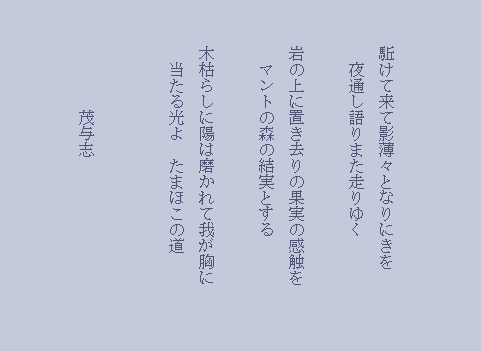right side Tanka---
Kakete kite kage usuusu to nariniki wo,
yodooshi katari mata hashiriyuku.
He runs and comes, his shadow has been vaguely,
talks all night, runs again and goes.
center Tanka---
Iwa no ue ni okizari no kajitsu no kansyoku wo,
manto no mori no ketujitsu to suru.
The feel of the fruit of desertion on a rock,
we considers it as fruition in the woods of cloak.
left side Tanka---
kogarashi ni hi wa migakarete waga mune ni ataru hikari yo,
tamahokono michi.
The sun is polished by the cold winter wind, the light which is hits to our breast,
the road of tamahoko.
SIGEYOSI
**notes
makura kotoba (pillow word) = a stock [conventional] epithet (used in Japanese poetry).
"tamahokono" invites "michi"(the road).
About TANKA(a Japanese poem of 31 syllables ,short poetry
of traditional Japan)
Tanka continues for 1300 years.It consists of the accent
of 31. 31 -- further -- it is divided into 5, 7, 5, 7,
and 7. The whole can be divided into the case of one
sentence, and two or three sentences. It is divided into
two sentence in many cases. Tanka utters and sings voice.
An aristocrat's man and woman were being used for the
change of a love letter. 1000 years before it will be
called WAKA and the time of a child was teaching all
aristocrats. It was practical use, and it was play and
was also art. But it became the poetry written and read,
after having become modernization. The haiku
poem(continues for 300 years.it consists of the accent of
17-- is divided into 5, 7, 5--the feature should have
Seasonal language=Season reference) was borne by Tanka.
Although Haiku of 10 million persons and Tanka is fewer
than it, they has many lovers (all expression person).
|

